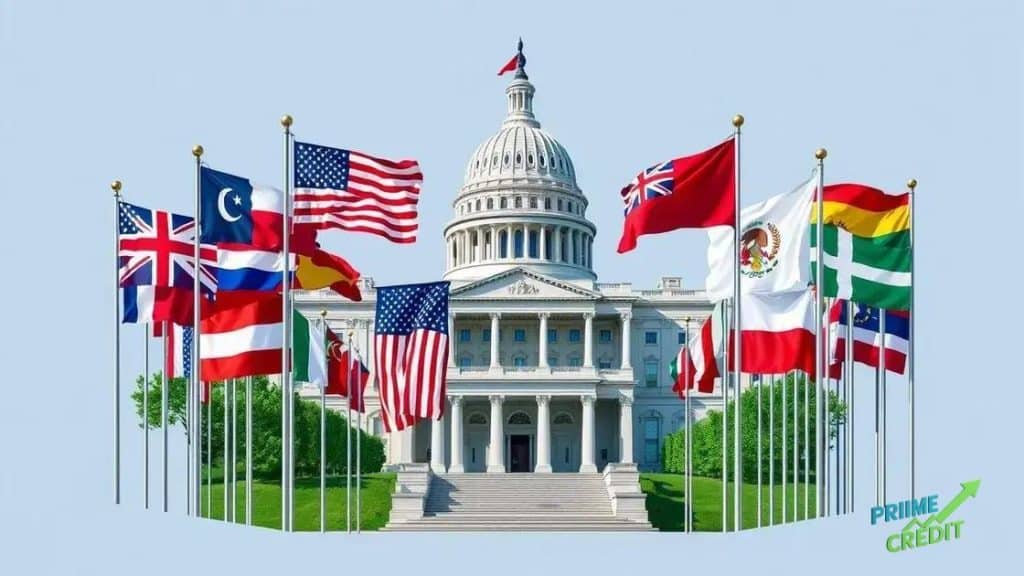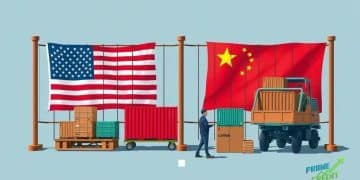Impact of U.S. domestic policies on international relations

The impact of U.S. domestic policies on international relations shapes global dynamics by influencing trade, diplomatic strategies, human rights advocacy, and climate change initiatives.
Strongly linked to global affairs, the impact of U.S. domestic policies on international relations often sets the tone for diplomatic interactions around the world. Have you ever thought about how these policies actually shape our international standing?
Understanding U.S. domestic policies
Understanding U.S. domestic policies is essential to grasp how they influence global affairs. These policies impact not just citizens but also how the nation interacts on the world stage.
Several key aspects shape these domestic policies, such as economic strategies, social issues, and national security objectives.
Economic Policies
Economic policies play a significant role in shaping international relations. For instance, trade agreements and tariffs can either strengthen or weaken ties with other nations.
- Trade agreements can open markets, enhancing cooperation.
- Tariffs and sanctions can create tensions and alter diplomatic conversations.
- An improved economic outlook boosts a nation’s influence globally.
Similarly, social issues such as healthcare, education, and immigration policies can resonate internationally. Nations observe how the U.S. manages these challenges, often emulating successful approaches.
National Security Policies
National security policies also impact the international landscape. These policies dictate how the U.S. engages with allies and adversaries alike.
For example, military alliances and defense strategies form a network of partnerships that shape world stability. Collaborative efforts strengthen security measures and foster mutual trust.
In summary, understanding U.S. domestic policies requires an examination of their multifaceted impact. The interplay between economic, social, and security matters reveals how these policies establish a foundation for international relations.
Key areas of impact on global relations

Key areas of impact on global relations reveal how U.S. domestic policies can ripple through the world stage. These areas include economic engagement, environmental policies, and human rights advocacy.
Economic Engagement
Economic policies significantly affect international relations. Trade agreements can either enhance cooperation or create barriers between countries.
- Tariffs often lead to trade disputes, affecting relationships with trade partners.
- Foreign investments can build strong alliances and improve diplomatic ties.
- Currency policies influence global markets, impacting U.S. standing.
Moreover, economic stability in the U.S. shapes global perceptions and trustworthiness. A strong economy often leads to a more influential voice in international discussions.
Environmental Policies
Environmental issues are increasingly important in the realm of global relations. Climate change initiatives affect international cooperation and lead to global partnerships.
Countries are watching how U.S. policies evolve regarding renewable energy and carbon emissions. A commitment to sustainability can enhance alliances and improve global standing.
Simultaneously, a lack of action may alienate key partners and harm progress in international agreements.
Human Rights Advocacy
Human rights issues serve as another crucial area influencing global relations. U.S. domestic policies on civil rights resonate internationally, shaping how other nations view the U.S. commitment to justice.
- Supporting global human rights initiatives fosters goodwill and collaboration.
- Conversely, failing to address domestic human rights issues can lead to criticism worldwide.
- International agreements on human rights can strengthen diplomacy.
In essence, understanding these key areas—economic engagement, environmental policies, and human rights advocacy—provides insight into how U.S. domestic policies shape global relations.
How policies influence diplomatic strategies
How policies influence diplomatic strategies is an essential aspect of international relations. U.S. domestic decisions shape methods of engaging with foreign nations, setting a framework for diplomacy.
Shaping Alliances
U.S. domestic policies can strengthen or weaken alliances. When the U.S. promotes policies that enhance economic growth or security, it builds stronger partnerships.
- Trade agreements encourage political ties by creating mutual benefits.
- Defense collaborations enhance security partnerships, making allies more reliable.
- Support for humanitarian efforts can foster goodwill between nations.
Conversely, isolationist policies can lead to strained relationships. When economic interests are prioritized over alliances, the U.S. risks distancing itself from long-time partners.
Impact on Negotiation Tactics
Domestic policy also affects negotiation tactics. A strong economy increases leverage in talks with other countries. This confidence allows the U.S. to navigate complex negotiations more effectively.
Moreover, clear foreign policy goals set the stage for diplomatic success. When the U.S. articulates its intentions clearly, it creates an environment where negotiations can thrive.
Cultural Diplomacy
Cultural initiatives are another domain influenced by U.S. policies. By promoting arts and education abroad, the U.S. enhances its soft power.
Engagement through culture can change perceptions and create lasting relationships. Initiatives like exchange programs foster understanding and strengthen ties.
Overall, how policies influence diplomatic strategies illustrates the intricate connections between domestic affairs and international relations. Each decision resonates beyond borders, shaping the way nations work together.
Case studies of recent international events

Case studies of recent international events highlight the impact of U.S. domestic policies on global relations. Analyzing these events reveals how internal decisions can affect diplomatic outcomes.
1. Trade Wars
The trade disputes between the U.S. and China serve as a prime example. U.S. domestic policies regarding tariffs aimed to protect American industries but led to increased tensions.
- Tariff imposition created challenges for international trade.
- Retaliatory measures from China impacted global supply chains.
- Negotiations highlighted the significance of balanced trade relations.
This case shows how U.S. policies can spark conflict and influence other countries’ economic strategies.
2. Climate Agreements
Another important case is the rejoining of the Paris Agreement. The shift in U.S. policies under a new administration signaled a renewed commitment to global climate goals.
This decision reassured allies and revitalized international efforts to combat climate change. It also encouraged other nations to reinforce their commitment.
3. Humanitarian Aid Responses
U.S. humanitarian responses during crises, like the devastating earthquakes in Haiti or Turkey, showcase the role of domestic policies in shaping international aid.
- Timely aid delivery strengthens U.S. global standing and trust.
- Collaborative efforts with NGOs highlight a united front.
- These actions foster long-lasting relationships between nations.
By analyzing these case studies, we see how U.S. domestic policies not only influence national interests but also reshape international relations in profound ways.
Future trends in U.S. foreign policy
Future trends in U.S. foreign policy are shaped by evolving domestic conditions and global dynamics. Understanding these trends can provide insights into how the U.S. will interact with the world.
1. Increased Focus on Multilateralism
A future trend is a greater emphasis on multilateral diplomacy. The U.S. is likely to strengthen alliances and work collaboratively with international organizations.
- Engagement in global coalitions can address pressing issues like climate change and pandemics.
- Cooperation with allies enhances collective security and shared goals.
- Multilateralism can also improve the U.S. image abroad.
This shift may cushion against global challenges by uniting nations for common purposes.
2. Emphasis on Human Rights
Human rights advocacy is expected to remain a core element of U.S. foreign policy. There will likely be a stronger focus on promoting democratic values.
Policies will aim to address human rights abuses globally, reflecting a commitment to justice. This focus could strengthen relationships with nations that prioritize similar values.
3. Adapting to Technological Changes
As technology evolves, so will foreign policy strategies. Cybersecurity and technology-related issues will drive future diplomatic efforts.
- Protecting digital infrastructure will become a priority.
- Collaboration on emerging technologies can foster economic partnerships.
- Policies must address information warfare and misinformation campaigns.
Adaptation to technological advances is essential for maintaining global influence.
4. Climate Change Initiatives
Future U.S. foreign policy will also likely prioritize climate change. As environmental challenges intensify, policies will increasingly focus on sustainable global practices.
Investment in green technologies and international environmental agreements can enhance U.S. leadership in this arena.
By exploring these future trends, we can anticipate how U.S. foreign policy will evolve, impacting global relations and shaping the future of international cooperation.
FAQ – Understanding U.S. Domestic Policies and Their Impact on International Relations
How do U.S. domestic policies affect international trade?
U.S. domestic policies can shape trade agreements and tariffs, influencing economic relations with other countries and affecting global supply chains.
What role does climate policy play in U.S. foreign relations?
Climate policy is crucial as it can strengthen alliances through shared environmental goals and commitments to sustainability, impacting global cooperation.
How are human rights issues connected to U.S. foreign policy?
Human rights advocacy informs U.S. foreign policy decisions, enhancing diplomatic relationships with nations that share similar values and commitments.
What are the future trends in U.S. foreign policy?
Future trends include increased multilateralism, a focus on human rights, adaptation to technological changes, and prioritizing climate initiatives.





